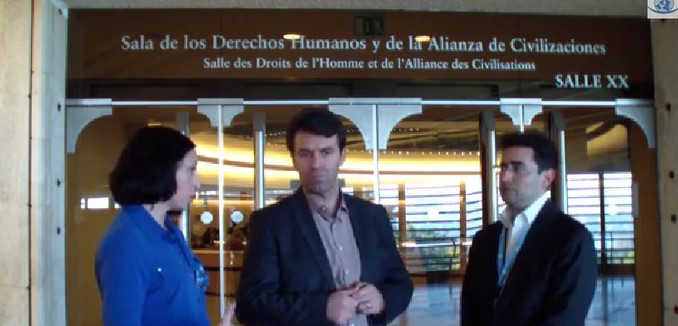Mohammad Mostafaei, the first lawyer for Reyhaneh Jabbari, the 26 year old woman Iranian who was recently executed for killing an assailant, told UN Watch Friday that Jabbari was not given a fair trial:
I was Reyhaneh Jabbari’s lawyer. Mr. Larijani’s statement is completely false. It is not true that she had a fair trial. Because the deceased in this case belonged to the intelligence services, the court treated the case differently, and gave undue weight to the prosecution. Key evidence in the case, and basic legal principles, were ignored.
Mostafaei, who was forced to flee Iran “after being persecuted by the authorities for his defense of individuals facing the death penalty,” was responding to the charge made by Mohammad Javad Larijani, Iran’s chief of human rights blaming Jabbari’s execution on a Western “media blitz.”
UN Watch brought Mostafaei and other Iranian dissidents to Geneva for Iran’s Universal Periodic Review (UPR) of its human rights record before the United Nations Human Rights Council (UNHRC). In the course of the UPR, Iran’s human rights record was lauded by the likes of Syria and Sudan.
Syria: "We commend the Islamic Republic's efforts on human rights." Sitting here as @UN_HRC reviews Iran's human rights record. #UPR #Iran
— Hillel Neuer (@HillelNeuer) October 31, 2014
Sudan to @UN_HRC: “Thank you, Iran, for your positive report and your commitment to human rights and progress, in face of unjust sanctions."
— Hillel Neuer (@HillelNeuer) October 31, 2014
Jabbari was hanged by Iran on October 25, despite widespread international outrage and appeals for mercy. Over 900 people have been executed by Iran since Hassan Rouhani became president in August 2013. The rise in executions was one factor prompting Canadian human rights expert Irwin Cotler to conclude that Iran under Rouhani “continues to engage in massive repression.”
[Photo: unwatch / YouTube ]




